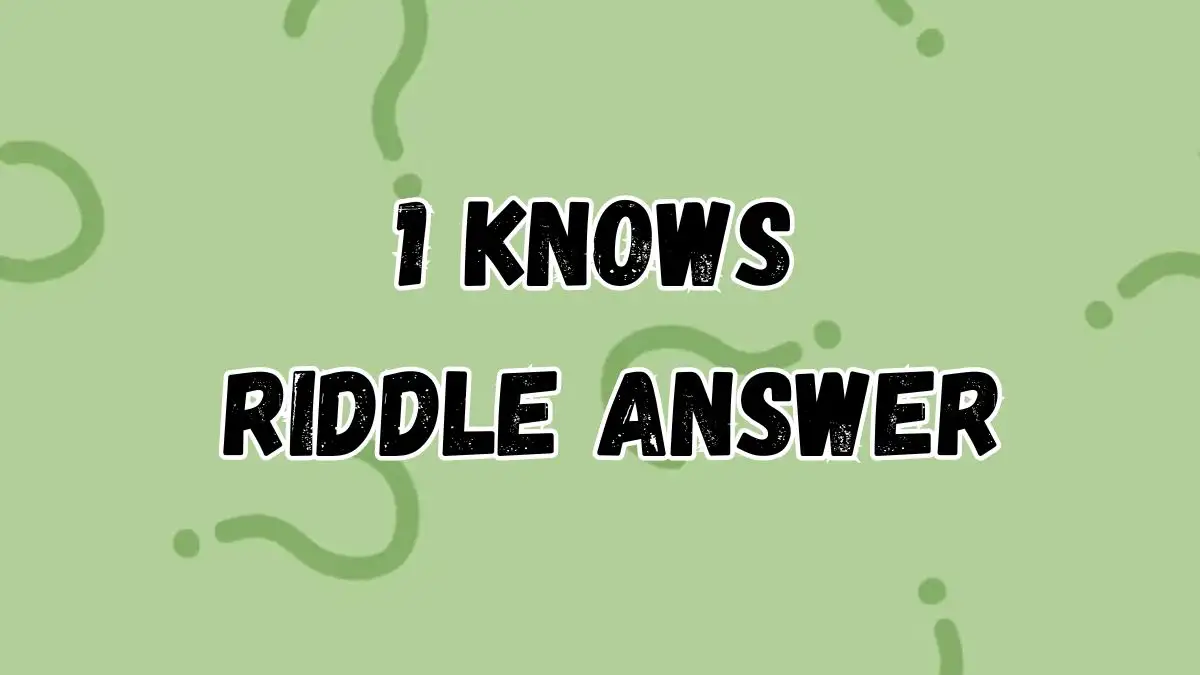1 Knows Riddle Answer Solved and Logically Explained
by Priyanka P
Updated Dec 09, 2023

1 Knows Riddle Answer
The riddle "1 Knows" is a clever play on words. The number '1' followed by the word 'knows' sounds like "won by a nose." This phrase is commonly used in horse racing to describe a very close victory, where a horse wins by a small margin, just the length of its nose.
The riddle relies on the pronunciation similarity between "knows" and "nose" to create a pun and reveal the answer. It's a wordplay that challenges the reader to think beyond the literal interpretation of the words and consider their phonetic sounds. In essence, the solution hinges on recognizing the connection between the number one and the concept of winning by a narrow margin.
Riddles in our page extends beyond the ordinary, offering you intricate puzzles that stimulate your intellect and provide hours of amusement. At Fresherslive you can get amazed with these riddles.
1 Knows Riddle Answer Explained
The riddle "1 Knows" cleverly combines the numeral "1" with the word "knows," pronounced like "nose." The solution to the riddle is "Won by a nose." The play on words hinges on the homophonic similarity between the number "1" and the word "won," while the pronunciation of "knows" sounds like "nose." In horse racing, "won by a nose" signifies a victory by the smallest of margins, just the length of a horse's nose.
The riddle invites readers to interpret the sounds of the words rather than their literal meanings. It's a delightful example of wordplay, demonstrating how language can be used creatively to convey a different meaning when pronounced in a particular way.
What is Riddle?
A riddle is a type of puzzle or word game that presents a mystery or question in a clever and often cryptic way. It typically involves a statement, question, or phrase with a hidden or double meaning, challenging the person to figure it out.
Riddles come in various forms, such as enigmas, which require creative thinking and metaphorical interpretation, and conundra, which rely on wordplay or puns in the question or answer.
Riddles have been part of human culture for centuries and can be found in many different cultures worldwide. They are like brain teasers, designed to engage the mind and encourage problem-solving. People enjoy riddles for the mental challenge and the satisfaction of unraveling the hidden meaning.
Riddles often serve as a form of entertainment and intellectual exercise, and they can be a fun way to test and expand one's thinking abilities.
Advantages of Solving Riddle
Solving riddles offers several advantages, making it an enjoyable and beneficial activity:
Mental Stimulation:
Riddles require critical thinking, creativity, and problem-solving skills. When you solve a riddle, you exercise your brain, keeping it active and sharp.
Enhanced Problem-Solving Skills:
Riddles often present complex challenges in a concise format. Solving them hones your ability to analyze information, think logically, and find innovative solutions.
Improved Language Skills:
Riddles play with words, encouraging better vocabulary, wordplay, and linguistic comprehension. They can be an enjoyable way to learn new words and phrases.
Boosted Confidence:
Successfully solving a challenging riddle can be incredibly satisfying, leading to increased self-confidence and a sense of accomplishment.
Entertainment:
Riddles are a source of entertainment and amusement, whether solved individually or as part of a group. They can be a fun way to pass the time.
Social Interaction:
Riddles often prompt discussions and interactions among people trying to solve them together, fostering teamwork and communication.
Cultural Understanding:
Riddles are found in many cultures, and solving riddles from different parts of the world can offer insights into diverse perspectives and traditions.
Creativity:
Riddles encourage thinking "outside the box" and inspire creative solutions to problems.
1 Knows Riddle Answer - FAQs
A riddle is a clever word puzzle or game presenting a mystery or question, often involving hidden meanings and creative interpretation.
Riddles, found worldwide, are engaging brain teasers designed for entertainment, intellectual exercise, and the satisfaction of unraveling hidden meanings.
Solving riddles enhances mental stimulation, boosts problem-solving skills, improves language abilities, instills confidence, offers entertainment, promotes social interaction, and provides cultural insights.
Riddles require critical thinking, creativity, and logical problem-solving, providing a workout for the brain and keeping it active and sharp.
Riddles play with words, fostering better vocabulary, wordplay, and linguistic comprehension, offering an enjoyable way to learn new words and phrases.







